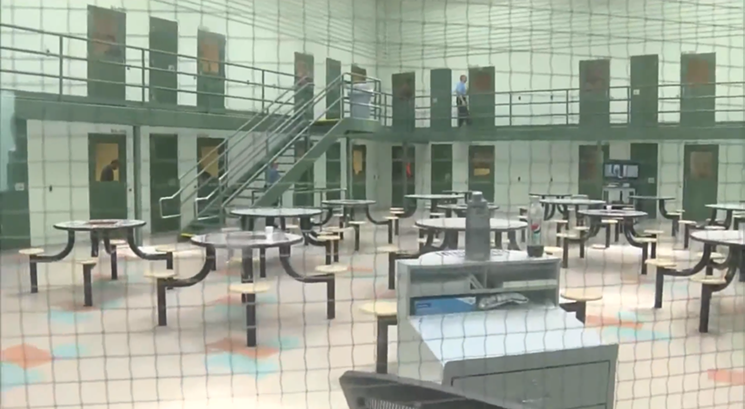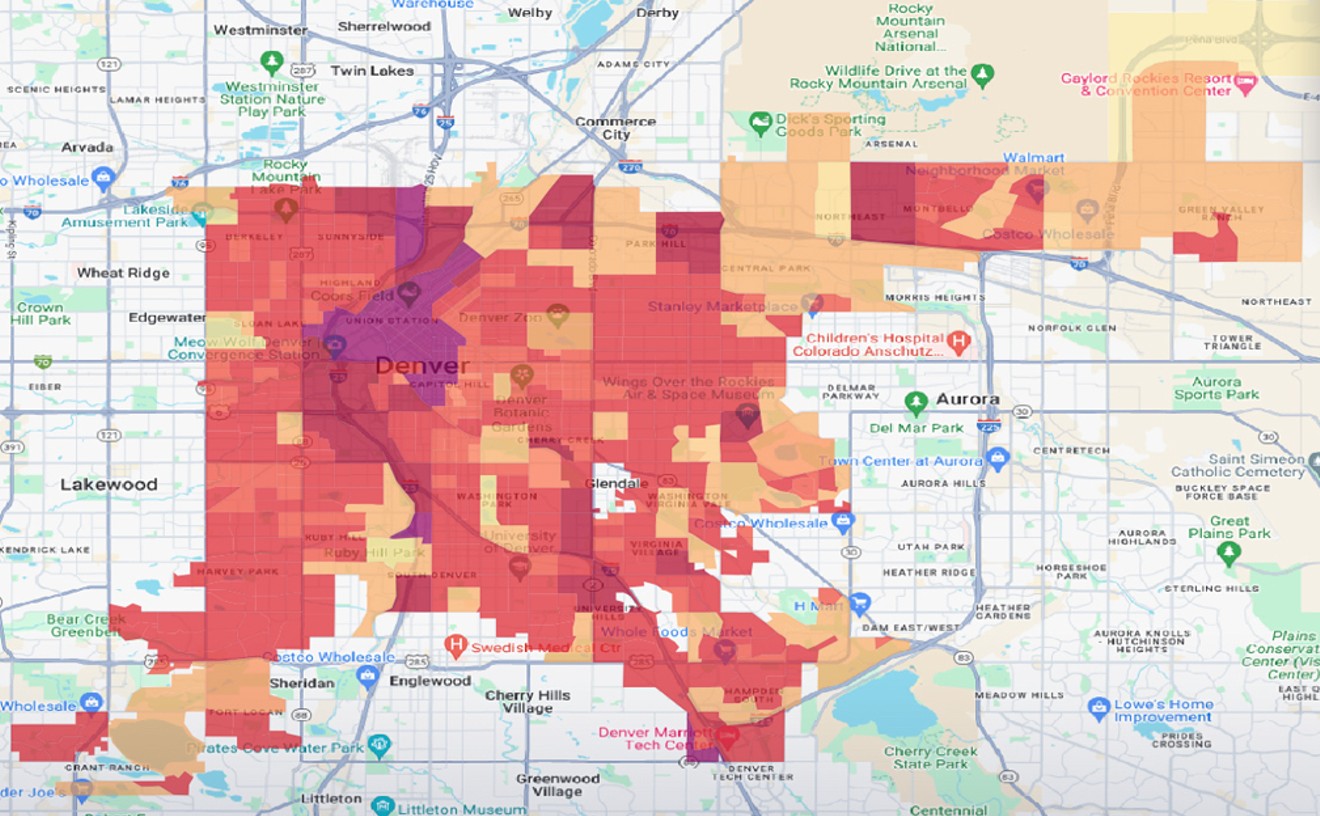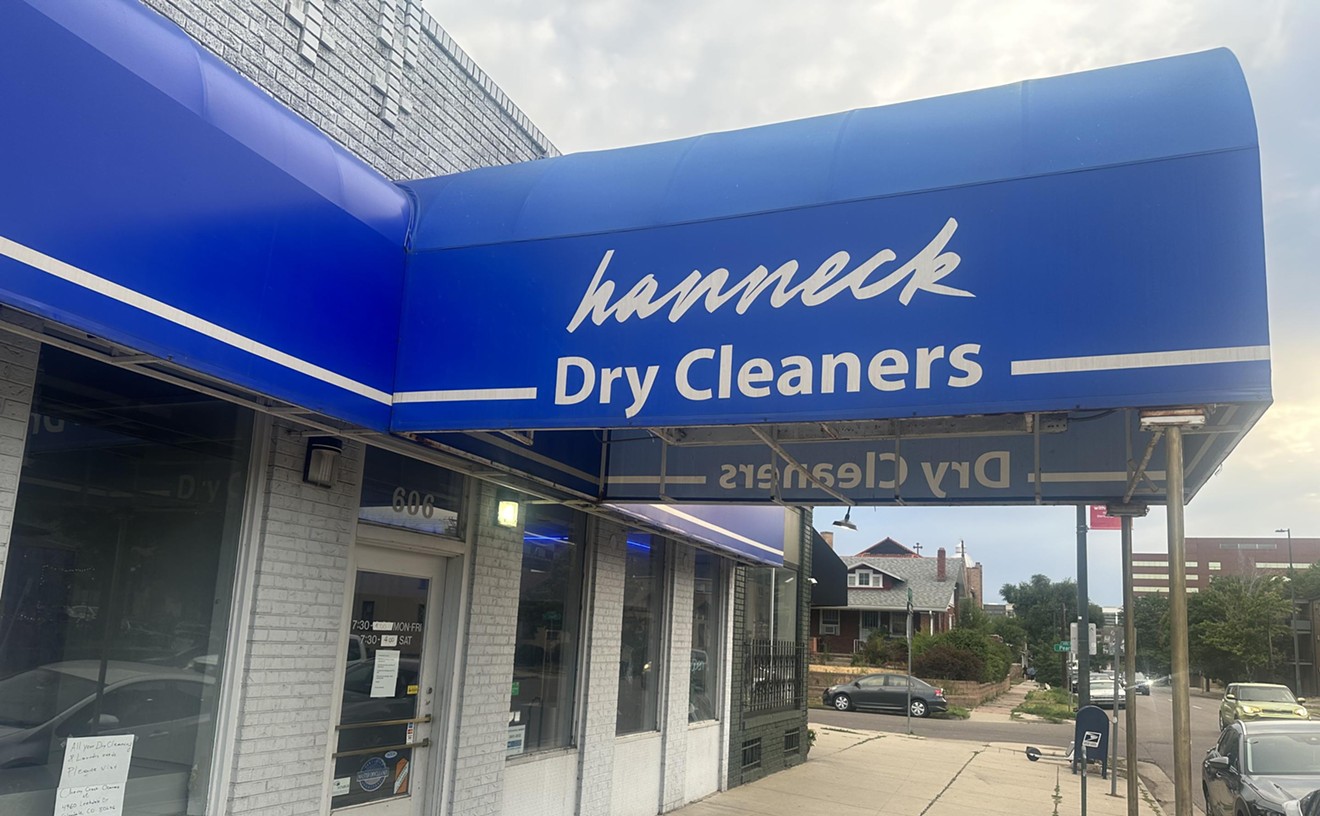The documents are photocopies of disciplinary reports from 2009, 2011 and 2014 that show Aurora ICE detainees being placed in solitary confinement for refusing to clean common areas. They're part of a class-action suit, Menocal v. GEO Group, filed in the U.S District Court of Colorado in 2014 by a group of Aurora ICE detainees alleging that GEO significantly underpays detainees for work, and even coerces them into working for free at the Aurora facility.
In court proceedings, GEO Group has insisted that its policies and practices are on the up-and-up, and that it hasn't violated any laws or ICE detention protocol through its voluntary work programs and cleaning requirements for detainees.
"In all instances, our employees appropriately followed the procedures and rules that govern the use of Special Management Housing Units, which are prescribed in detail in the federal government’s Performance-Based National Detention Standards," says Pablo Paez, a vice president for GEO Group, using a GEO Group euphemism for "solitary confinement."
Until now, much of what's documented in the disciplinary reports has only been described by detainees and lawyers in court pleadings.
Plaintiffs "allege that each day, six randomly selected detainees (whether they participate in the Voluntary Work Program or not) are required to clean the facility’s 'pods' without compensation under threat of solitary confinement," Judge John L. Kane of the U.S. District Court of Colorado wrote in a July 2015 ruling on the case.
The documents in the federal court case — which had been restricted but eventually became unrestricted, perhaps owing to an oversight by GEO's lawyers — show that staffers at the Aurora ICE facility have a history of coercing detainees into cleaning common areas for free, a violation of ICE policy.

This disciplinary report from August 31, 2014, shows GEO staffers placing detainees in solitary confinement for refusing to clean common areas.
PACER
In another instance, on August 3, 2014, an Aurora detainee "was assigned to spray off the tables, windows and telephones for the day." The detainee, who told a guard, "Fuck you guys, you can't make me clean," was then placed in solitary confinement. Staffers noted that he'd violated GEO rules with his "insolence towards staff" and "failure to clean assigned living area."
These instances of Aurora ICE detainees being punished for refusing to clean common areas appear to violate ICE's Performance-Based National Detention Standards, which the agency and the entities with which it contracts abide by for protocol.
A section of the PBNDS titled "Voluntary Work Program" includes guidelines under which detainees are allowed to voluntarily work in various jobs in the kitchen, laundry room and other spots and make at least $1 per day. At Aurora, GEO pays detainees a dollar a day for this work. In the past, the company used to also give detainee workers a bottle of soda a week, but that practice has been discontinued, according to GEO documents.
The practice of paying these detainees just a dollar a day is at issue in the federal case; allegations that GEO violated "unjust enrichment" laws have survived a motion to dismiss.
"The Voluntary Work Program has been in place for decades at all ICE Processing Centers and became part of the federal government’s Performance-Based National Detention Standards under President Obama’s administration, to which we adhere. Under no circumstances are individuals in our ICE Processing Centers placed in Special Management Housing Units for not participating in the Voluntary Work Program," says Paez.
But that section of the PBNDS also notes that "work assignments are voluntary; however, all detainees are responsible for personal housekeeping."
The PBNDS then adds that "detainees are required to maintain their immediate living areas in a neat and orderly manner" by making their bunk beds daily, stacking loose papers, "keeping the floor free of debris and dividers free of clutter," and "refraining from hanging/draping clothing, pictures, keepsakes, or other objects from beds, overhead lighting fixtures or other furniture."
The way this section of the PBNDS is written, these various requirements aren't simply examples of how detainees should keep their immediate living areas clean, but instead the four ways in which they should do so.
This indicates that cleaning of common areas would not fall under "personal housekeeping."
And that means that cleaning of common areas would normally be an activity for those participating in the voluntary work program, not something that every detainee must do under the threat of solitary confinement.
That's why attorneys for the plaintiffs have argued in court that threatening detainees with or placing them in solitary confinement for refusing to clean common areas violates the Trafficking Victims Protection Act's prohibition on forced labor.
So far, that argument has been successful, as the legal claim regarding violations of the Trafficking Victims Protection Act has survived both a motion to dismiss and an appeal to the Tenth Circuit Court of Appeals.

Most detainees in the Aurora ICE facility are housed in cells that each have four detainees inside. These cells typically surround common areas.
Fox31
At the Aurora ICE facility, detainees are usually housed in "pods" that consist of multiple cells where typically up to four detainees have beds. During the day, detainees in these pods have access to common areas that have seats, tables and televisions.
In the 2013 GEO handbook given to Aurora detainees, there's a section called "Housing Unit Sanitation." The section notes that "all detainees in a housing unit are required to keep clean and sanitary all commonly accessible areas of the housing unit, including walls, floors, windows, window ledges, showers, sinks, toilets, tables, and chairs."
The section goes on to say that "all detainees will take turns cleaning the area," and notes that if detainees are instructed to clean a part of the day room area that isn't clean and refuse to do so, they can be punished with disciplinary action.
"Refusal to clean assigned living area," an offense listed in the handbook, carries with it the possible penalty of up to 72 hours of solitary confinement.
In an October 2019 deposition for the federal lawsuit, Amber Martin, a vice president at GEO Group, said that "assigned living area" suggests something more than just cells. "The assigned common area, the assigned living area, is where detainees eat, recreate, watch television, have programs. That's their area that they live in. It's not just their cell," Martin said.
That interpretation from GEO contradicts the section of the PBNDS that describes the four aspects of required cleaning relating to cells and/or an immediate area around a bed for a more warehouse-style setting. Nowhere in the PBNDS is there a mention of required cleaning of common areas, such as a day room.
In recent years, after the lawsuit was filed, GEO formalized a policy of not allowing the punishment of solitary confinement for detainees who refuse to clean their rooms, Martin testified, acknowledging that it had been an informal policy before.
The documents that show the photocopies of disciplinary reports would normally be restricted and inaccessible to members of the public. In fact, when they were filed in April by the legal team for the plaintiffs suing GEO Group, they were automatically restricted. However, GEO Group lawyers never filed a motion to continue to restrict the documents, so after a month and a half, the documents automatically became unrestricted.
Congressman Joe Neguse, whose office found out about the documents on October 13, is especially interested in them; in July, he questioned the CEO of GEO Group about the exact issues raised by the documents.
"Has GEO ever used the threat of solitary confinement or segregation or other sanction to force individuals to clean and sanitize common areas?" Neguse asked George Zoley, GEO Group's CEO, during a House Homeland Security Subcommittee on Border Security, Facilitation, and Operations hearing.
"Detainees are required by ICE to keep their own personal areas clean, and that’s a requirement by ICE," Zoley responded.
Unsatisfied with that answer, Neguse then asked: "I’m not asking about their personal areas, Dr. Zoley. I’m asking about common areas. But how about this? I’ll rephrase it: Has GEO ever coerced immigration detainees into volunteering to perform work by threatening or imposing disciplinary segregation, administrative segregation or solitary confinement or any other kind of sanction?"
"Absolutely not," Zoley answered confidently.
“The documents in the Menocal v. GEO Group matter appear to show evidence that GEO sent immigrant detainees to solitary confinement for refusing to work, in potential contravention of ICE’s policies and contradicting their CEO’s testimony,” Congressman Neguse says now.
“Americans fully expect federal contractors, many of which receive substantial taxpayer funding, to testify honestly when Congress exercises its oversight duties," he continues. "Any attempt to mislead Congress, and thereby the American people, must be taken seriously. The company must immediately clarify this matter without delay.”
GEO Group takes issue with Neguse's statement.
“We strongly reject this willful mischaracterization of Mr. Zoley’s congressional testimony," says Paez. "As the video and transcript of his testimony clearly show, he was specifically addressing a question related to the Voluntary Work Program at ICE Processing Centers."













